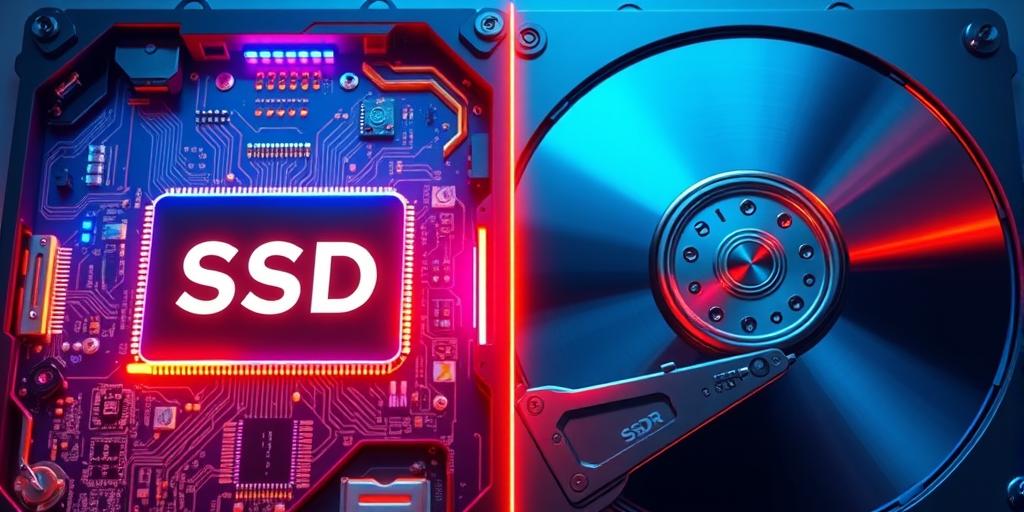Choosing the right storage for your computer can be a daunting task. The sheer number of options available, each with its own technical specifications, can leave you scratching your head. But fear not, intrepid tech explorer! This guide will cut through the jargon and unveil the crucial differences between SSD and HDD storage, helping you make an informed decision that’ll leave your digital world running smoothly. Get ready to dive deep into the heart of this technological debate—SSD vs. HDD: The ultimate storage showdown!
Understanding SSD Storage: The Speed Demon
Solid State Drives (SSDs) are the sleek, speedy newcomers in the storage arena, offering a significant performance upgrade compared to their older, hard-disk counterparts. Unlike HDDs, SSDs have no moving parts; instead, they use flash memory to store data. This fundamental difference is the root of SSD’s superior performance. Let’s explore some key advantages:
Blazing-Fast Data Access: Experience the Speed
The absence of mechanical components translates to dramatically faster boot times, application loading, and file transfers. You’re no longer staring blankly at a loading screen. Everything’s quicker, smoother, and more efficient. Imagine a world where your computer wakes from sleep almost instantly, and programs launch without delay—that’s the SSD promise.
Enhanced Durability and Shock Resistance: The Rugged Survivor
Since there are no moving parts, SSDs are incredibly durable and resistant to shocks and drops. This ruggedness makes them ideal for laptops, tablets, and other portable devices where accidental bumps and jolts are a real possibility. Unlike HDDs, which can suffer data loss from even minor impacts, SSDs offer peace of mind and data security.
Improved Power Efficiency: A Green Choice
SSDs consume far less power than HDDs, contributing to longer battery life in laptops and lower energy bills. Their low power consumption adds to their appeal, making them an environmentally conscious choice for the tech-savvy consumer.
Deciphering HDD Storage: The Workhorse
Hard Disk Drives (HDDs) are the veteran storage solution, having served as the standard for decades. Their core technology relies on spinning platters and a read/write head to access and store data. While HDDs have been largely superseded by SSDs in many applications, they still hold a few advantages:
Cost-Effective Storage: Budget-Friendly Solution
HDDs offer significantly more storage capacity per dollar than SSDs. If you’re on a budget and need a large storage space, HDDs remain a more affordable alternative for mass storage of photos, videos, and other large files. For archiving and less-demanding applications, their price point is undeniable.
Ample Storage Capacity: The Data Reservoir
For many users, the sheer amount of storage space offered by HDDs is simply unmatched. While SSD capacities are increasing, HDDs still hold the edge in terms of the amount of data they can store for applications where you need to store large amounts of information, such as home security footage or scientific data.
Mature Technology: A Reliable Choice
HDD technology is mature and well-understood, leading to high reliability and availability of support and repair services. The longevity of HDDs is a factor to consider when making your decision; you may find it simpler to find repairs or replacements.
SSD vs HDD: The Ultimate Showdown
So, which storage type reigns supreme? The answer depends largely on your individual needs and priorities. If speed and durability are paramount, SSDs are the clear winner. However, if you need massive storage at a low cost, HDDs still hold their ground. For some users, a hybrid approach using both SSDs and HDDs is the optimal strategy: an SSD for the operating system and frequently used applications, and an HDD for less-frequently accessed data.
Choosing the Right Storage for Your Needs
Consider these questions:
- What’s your budget? SSDs are more expensive per gigabyte than HDDs.
- What kind of performance do you need? SSDs offer significantly faster performance.
- How much storage space do you need? HDDs offer larger capacities.
- How important is durability? SSDs are more durable than HDDs.
By carefully weighing these factors, you can select the storage solution that perfectly fits your unique requirements. Knowing the differences between SSD and HDD storage will empower you to choose the most suitable option for your system and will allow you to keep your device performing at its peak.
Conclusion: Make the Smart Choice Today!
Ready to upgrade your storage? Understanding the differences between SSD and HDD storage is the first step towards optimizing your system’s performance. Don’t settle for lag and slow loading times any longer. Explore your options, weigh the pros and cons, and take the leap toward faster, more efficient computing! Upgrade your storage today and experience the difference!




